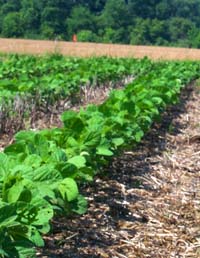Edible Soybeans May Prove a Tasty Alternative
Edible Soybeans May Prove a Tasty Alternative

Daviess County farmer Sara McNulty has been on a crusade in recent years to introduce an edible soybean as another crop alternative for Kentucky farmers.
Visitors at the recent University of Kentucky College of Agriculture Research and Education Center field day at Princeton had a chance to see some of the beans growing in test plots and to sample a few for taste.
The beans do not contain three enzymes found in regular soybean varieties that make the taste bad to many Americans, McNulty said. The beans in the green stage can be boiled and eaten like peanuts or sauteed or used in food dishes.
The edamame, a specialty soybean, have a sweet, nutty taste and are rich in protein, isoflavones, vitamin C and calcium. They are considered a horticultural crop. The beans can also be taken to the dry stage and used for milk and tofu.
Kentucky Soybean Association has received a $75,000 value-added grant from the Kentucky Department of Agriculture for "Soybeans for Human Nutrition." The project aims to establish markets for the soybeans, and the KSA has also funded part of the research project. McNulty, who has grown the soybeans for three years, is a consultant on the project.
Part of the research includes the best way to produce, harvest and bundle the beans for market. This is the first year the KSA as been involved in research involving the beans in the green stage, said Debbie Ellis, project coordinator.
"Basically, we are trying to create some niche markets to give soybean and tobacco farmers something to make money on in this depressed economy," Ellis said.
The beans look to be a better fit with tobacco growers because they are labor intensive, she said.
UK College of Agriculture and Cooperative Extension Service specialists in marketing, soybean plant breeding, weed science, grain crops and plant physiology have worked on the project. Family and Consumer Science specialists have used the beans in recipes at demonstrations.
"We've been working with about everyone under the sun to learn more about these beans and how they can work in Kentucky," Ellis said.
Martha Lee, Daviess County Family and Consumer Science extension agent, used the edamame beans during a recent cooking demonstration for heart patients. There were about 40 people in the class and the beans proved popular.
Lee said the beans have a lot of possibilities because they are healthy and versatile, two things consumers want today. They can be used as snacks, in salads and vegetable dishes, she said.
In addition to the test plots at UKREC, there are 10 farmers in western and central Kentucky growing the beans this year. Some of these beans will go to Farmers Markets and some will appear in grocery stores.
The project will also provide information on the costs of producing a 22 to 25 pound box of the beans, Ellis said. That will allow farmers just starting out to know what their costs will be, she said.
The beans taken to the dry stage will be processed into flakes and other samples for companies to see if they are suitable to use in soybean based foods. Samples have been sent to Korea as well as to U.S. companies, McNulty said.
The KSA has been working on various projects with the edible soybeans in the dry stage for several years.
